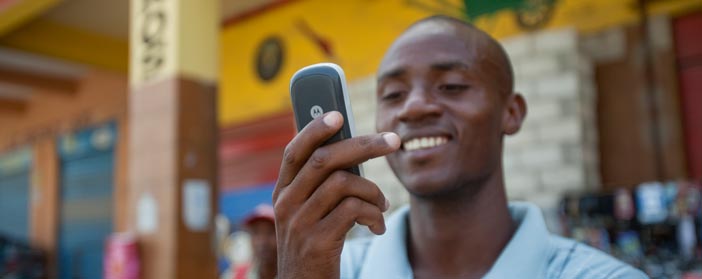Leveraging Mobile Innovation to Combat Poverty

A mobile phone user outside a mobile payment facility in Port-au-Prince, Haiti.
August 19, 2013 –The Financial Services for the Poor program at the Bill and Melinda Gates Foundation focuses on solving problems related to providing access to formal financial services for the world’s poorest. Worldwide, 2.5 billion adults lack access to formal financial services. This limits their ability to protect against unexpected expenses like illness, and it keeps them from economic opportunities such as starting businesses or pursuing an education. We believe that a critical part of the solution requires digitization of financial services in order to reduce costs, increase access, and help people move out of poverty.
As a team based in Seattle, surrounded by both technology giants and startups, we often wonder how we can bridge the technology gaps between financial services in the developed world and developing world. Despite the dramatic differences we have in services and needs with those living in developing countries, we knew there must be some way in which all of the latest innovations in mobile technology and financial services could apply to less advanced markets.
With the advent of new technologies, it is possible for mass markets in underbanked countries to shift to digital, making it viable for providers to offer the range of financial products we often take for granted. New low-cost mobile innovations for financial services have the potential to be a powerful tool in combating global poverty. More than 2 billion people worldwide own mobile phones, making the mobile phone a direct conduit to a significant portion of the world’s underbanked. Empowering the poor to save and invest in themselves and others will create opportunities to move people out of poverty.
In order to advance our thinking, we developed a Digital Money Innovation Framework that helps us zoom in on a critical component of the value chain and organize our research and ideas in accordance with some of the biggest barriers we see in digitizing financial services for low-income populations. By developing this new framework and identifying innovative companies focused on a particular component, it became clear to us how innovations like Square can dramatically reduce hardware costs in Pakistan, or how a company called Jumio, which provides mobile imaging and ID verification technology, might reduce customer registration time in Bangladesh from 30 days to 30 seconds. We also learned from technology innovators in developing countries; Kopo Kopo in Kenya, a company developing efficient ways to onboard merchants to mobile money platforms, will likely be a model for acquirers seeking to integrate mobile money in the retail payments space.
We’re writing today to share this framework with others – both those from the nonprofit community as well as those working in the broader arena of technology and financial services – and to stimulate creative thinking about how innovative technology and business models could help deliver financial services to lower-income geographies. We believe there is a lot to learn, and we invite readers to join us on this exciting new journey.
We encourage the payments industry – from the industry’s established leaders to fledgling startups – to create mobile solutions with the potential to have a profound impact on underserved consumers of the world. In this effort, we are supporting ETA to launch an innovative start-up competition at its annual Strategic Leadership Forum (SLF). The Payments Next Zone (PNZ) will showcase game-changing technologies that empower the underbanked. The ETA SLF will take place at the Montelucia Resort in Scottsdale, Ariz., Oct. 15 – 17.
To download the Digital Money Innovation Framework document and a printable 11×17 poster, click here: http://bit.ly/digitalmoneyinnovation.
Startup companies are encouraged to apply for the Payments Next Zone and E-Pay Innovation Award online. For more information, visit https://electran.org/conferences-events/2013-eta-strategic-leadership-forum/.
[spacer height=3] [divide] [spacer height=3] Lynn Eisenhart and Megan Oxman are Program Officers, Financial Services for the Poor, at the Bill & Melinda Gates Foundation.